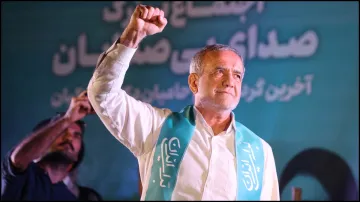Who is Masoud Pezeshkian, a heart surgeon who is set to become Iran's next President?
A lawmaker from the reformist camp, Pezeshkian has sometimes criticised Iran's clerical establishment for suppressing dissent and advocates warmer ties with the West. However, he remains faithful to Iran's theocracy and is doubtful to challenge the authority of the Supreme Leader.

Iran presidential elections: Being a low-profile moderate candidate in Iran's hardline theocratic rule is obviously going to be challenging. While Masoud Pezeshkian, a 69-year-old heart surgeon, has advocated warmer relations with the West and social liberalisation, he has also remained faithful to Iran's theocratic rule and never radically challenged the policies that have created widespread discontent in the public.
Pezeshkian is now set to become Iran's next President and will replace Ebrahim Raisi, who was once seen as the successor of Supreme Leader Ayatollah Ali Khameini before his untimely demise in a helicopter crash on May 19. Pezeshkian was pitted against hardline candidate Saeed Jalili in the run-off presidential elections on Friday and won 16.3 million votes against the latter's 13.5 million.
Pezeshkian has aligned himself with other moderate and reformist figures during his campaign for his presidential bid. His main advocate has been former Foreign Minister Mohammad Javad Zarif, who reached Iran’s 2015 nuclear deal with world powers that saw sanctions lifted in exchange for the atomic program being drastically curtailed. The deal was eventually withdrawn by former US President Donald Trump.
Who is Masoud Pezeshkian? 5 POINTS
- Pezeshkian was born on September 29, 1954, to an Azeri father and a Kurdish mother in Mahabad in northwestern Iran. Fluent in Azeri, he served in the Iran-Iraq war and was tasked with sending medical teams to the battlefield. Upon his return, he became a heart surgeon and served as the head of the Tabriz University of Medical Sciences.
- Tragedy struck the President-elect's life as his wife and a daughter were killed in a car crash in 1994. Pezeshkian never remarried and raised his remaining two sons and a daughter by himself.
- Pezeshkian's political journey began when he was appointed Iran's deputy health minister in 1997 and later as health minister under former reformist President Mohammad Khatami. He was elected as a lawmaker from Tabriz in 2006 and has been elected four times since then. As a lawmaker, he has criticised the establishment's suppression of political dissent.
- He later served as a deputy parliament speaker and backed reformist and moderate causes, though analysts often described him more as an “independent” than allied with the voting blocs. That independent label also has been embraced by Pezeshkian in the campaign. At the same time, he honoured Iran's Revolutionary Guard and praised it for shooting down an American drone in 2019.
- In 2011, Pezeshkian registered to run for president, but withdrew his candidacy. In 2021, he found himself and other prominent candidates barred from running by authorities, allowing an easy win for Raisi.
What were Pezeshkian's promises?
In this campaign, Pezeshkian’s advocates have sought to contrast him against the “Taliban” policies of Jalili. His campaign slogan was “For Iran" based on a popular song written by Iranian singer-songwriter Shervin Hajipour, who has been sentenced to more than three years in prison over his anthem for the Mahsa Amini protests.
His election comes at a time of rising public discontent with the theocracy for economic stagnation, corruption, mismanagement and restrictions on social and political freedom. Pezeshkian has long called for detente with the West, economic reform, social liberalisation and political pluralism.
Hence, he is someone world powers are likely to welcome, hoping he might pursue peaceful ways out of a tense standoff with Iran over its fast-advancing nuclear programme at a time of boiling regional tensions, particularly concerning Israel. He also carries the hope of millions of Iranians having painful memories of the post-Mahsa Amini unrest crackdown and seeking fewer restrictions on social freedom.
“We are losing our backing in the society, because of our behaviour, high prices, our treatment of girls and because we censor the internet,” Pezeshkian said at a televised debate on Monday night. “People are discontent with us because of our behaviour.”
What challenges does he face?
Under Iran's dual system of clerical and republican rule, the president cannot usher in any major policy shift on Iran's nuclear programme or support for militia groups across the Middle East, since Supreme Leader Ayatollah Ali Khamenei has the final say on top state matters. However, the president can influence the tone of Iran's policy and he will be closely involved in selecting the successor to Khamenei, now 85.
Many voters are sceptical about Pezeshkian's ability to fulfil his campaign promises as the former health minister has publicly stated that he had no intention of confronting Iran's power elite of clerics and security hawks. "If I try but fail to fulfil my campaign promises, I would say goodbye to political work and not continue. There is no point in wasting our life and not being able to serve our dear people," he told voters in a video message.
"Pezeshkian might be able to bring some social freedoms. But he will be a weak president because Khamenei and his allies are much more powerful than the president," said Sohrab Hosseini, a 45-year-old businessman in Iran's Kish Island.
(with inputs from agencies)
ALSO READ | Iran: Masoud Pezeshkian to become President, beats hardliner Saeed Jalili in run-off elections